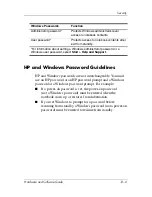
Wireless
Hardware and Software Guide
11–11
Bluetooth (Select Models Only)
The Bluetooth device provides short-range wireless
communications that replace the physical cable connections that
traditionally link electronic devices such as
■
Network access points.
■
Computers (desktop, notebook, PDA).
■
Phones (cellular, cordless, smart phone).
■
Imaging devices (printer, camera).
■
Audio devices (headset, speakers).
The devices are represented in the Bluetooth for Windows
software by graphical icons that resemble their physical features,
which makes them easily recognizable and distinguishes them
from other classes of devices.
The Bluetooth for Windows software provides the following
functions:
■
Personal Information Management (PIM) item
transfer—Sends and receives information files such as
business cards, calendar items, notes, and message items to
and from another Bluetooth computer or device.
■
PIM synchronization—Synchronizes PIM data between a
computer, PDA, or cell phone using Bluetooth.
■
File Transfer—Sends and receives files to and from another
Bluetooth computer.
■
Network access (Personal Area Networking Profile)—
Enables 2 or more Bluetooth devices to form an ad-hoc
(peer-to-peer) network. Provides a mechanism that enables a
Bluetooth device to access a remote network through a
network access point. The network access points can be
traditional LAN data access points or group ad-hoc networks
that represent a set of devices that are attached only to one
another.
■
Dial-up networking—Connects Bluetooth devices to the
Internet.
















































